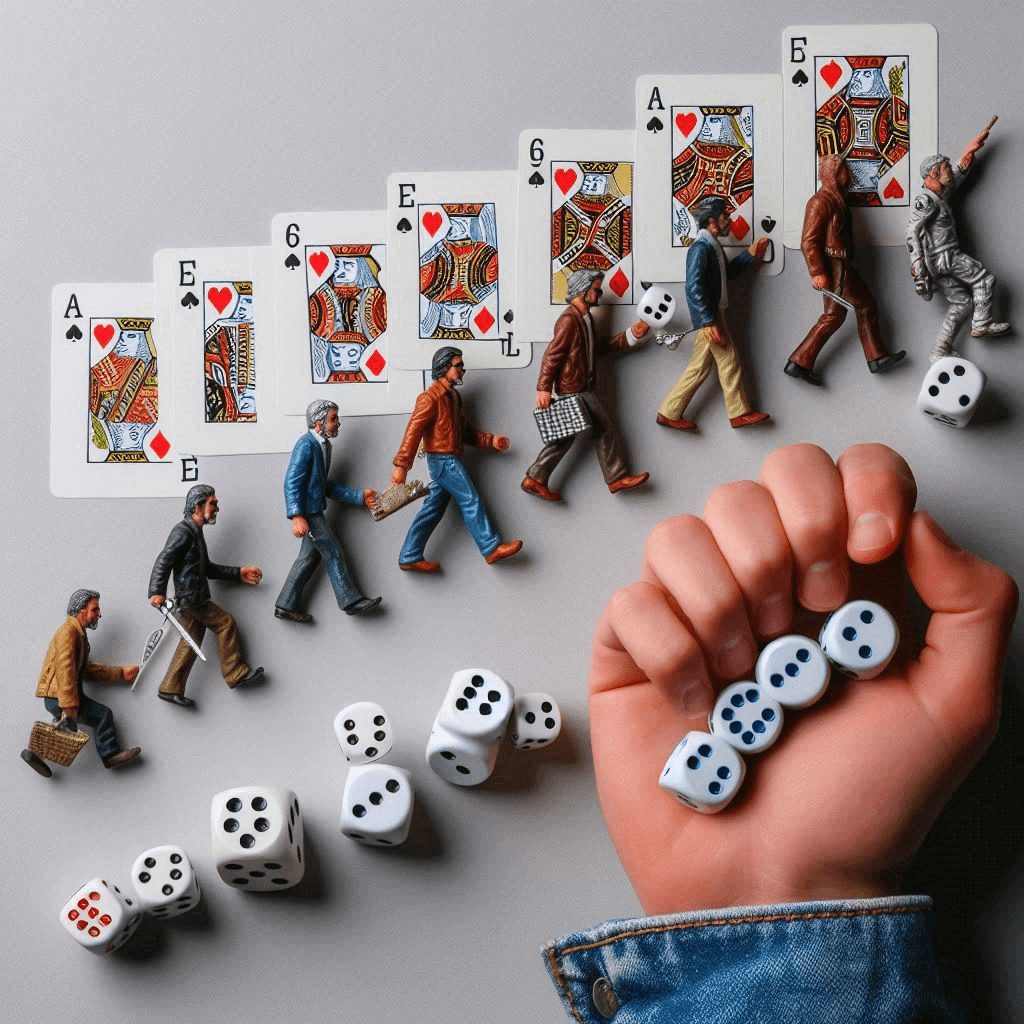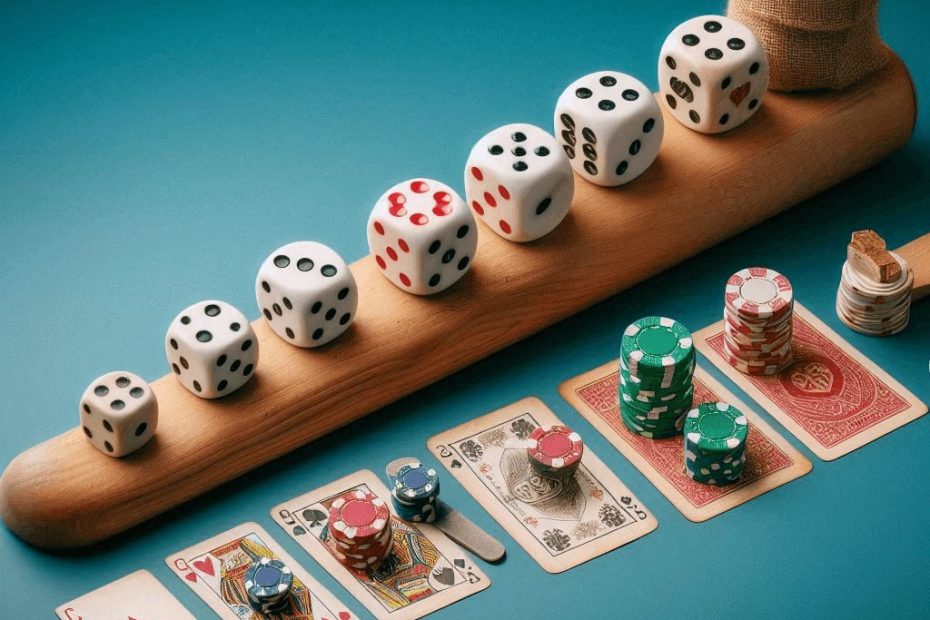Poker has long been celebrated as one of the most popular card games around the world. Its blend of chance, psychology, and skill has captivated players for generations. However, an intriguing variant has emerged from the shadows of traditional poker. This unique game combines the thrill of poker with the randomness of dice, creating a fresh take on a classic pastime.
In this article, we will explore the fascinating evolution of poker dice, tracing its origins, development, and the impact it has had on gaming culture. We will delve into the rules and strategies of dice, compare it to traditional poker, and examine its growing popularity in modern gaming. Join us as we embark on this fun journey from classic cards to rolled hands!
The Origins of Poker Dice
The Birth of Poker
The history of poker dates back to the early 19th century in the United States. While the exact origins are debated, it is widely believed that the game evolved from various earlier card games. The first known mention of poker was in the 1830s, and it quickly gained popularity, spreading across the country.
The Rise of Dice Games
Dice games have been around for thousands of years, with ancient civilizations using them for both gaming and divination. The use of dice in gaming can be traced back to cultures like the Egyptians, Greeks, and Romans. Over time, various dice games evolved, showcasing the randomness and excitement associated with rolling dice.
The Fusion of Poker and Dice
The fusion of poker and dice likely occurred in the late 19th or early 20th century. As poker gained popularity, players began experimenting with different formats and variations. The concept of poker dice emerged as a way to combine the strategic elements of poker with the unpredictability of dice rolling.
The Mechanics of Poker Dice
Understanding Poker Dice
Poker dice are specially designed dice that feature poker hands instead of traditional pips. Each die typically has six faces, with each face representing a different poker hand. Common hands include:
- Pair
- Two Pair
- Three of a Kind
- Straight
- Flush
- Full House
- Four of a Kind
- Straight Flush
- Five of a Kind
How to Play Poker Dice
The rules of poker are relatively simple, making it accessible for players of all ages. Here’s a basic overview of how to play:
- Setup: Each player starts with a set number of dice (usually five).
- Rolling: Players take turns rolling their dice, aiming to create the best poker hand possible.
- Re-Rolls: After the initial roll, players can choose to re-roll some or all of their dice to improve their hands.
- Scoring: Players reveal their hands, and the player with the highest-ranking hand wins the round.
Variations of Poker Dice
Several variations of poker exist, each introducing unique rules and gameplay mechanics. Some popular variations include:
- Three-Dice Poker: Players use only three dice, which can lead to faster gameplay and different strategic considerations.
- High-Low Poker Dice: This variation allows players to compete for both the highest and lowest hands, adding an extra layer of strategy.
- Joker Dice: Some versions include a joker die that can act as a wild card, enabling players to create stronger hands.


The Popularity of Poker Dice
Growing Interest in Casual Gaming
As gaming culture has evolved, there has been a notable shift towards casual and social gaming experiences. Poker dice fit perfectly into this trend, offering a fast-paced, fun alternative to traditional poker. The simplicity of the rules makes it easy for newcomers to join in, while still providing strategic depth for seasoned players.
The Appeal of Hybrid Games
It represent a hybrid gaming experience, combining elements from both card games and dice games. This fusion has proven appealing to a wide range of players, as it allows for a different type of strategy and gameplay than traditional poker.
Online and Mobile Adaptations
The rise of online gaming has further propelled the popularity of poker dice. Numerous online platforms now offer poker dice as part of their gaming portfolios, allowing players to enjoy the game from the comfort of their homes. Mobile applications have also emerged, making poker dice accessible to players on the go.
Strategies for Poker Dice
Understanding Hand Rankings
Just like in traditional poker, understanding hand rankings is crucial in poker dice. Familiarizing yourself with the rankings will help you make informed decisions during gameplay and develop effective strategies.
Risk vs. Reward
When deciding whether to re-roll dice, consider the potential outcomes. Holding onto a strong hand may be wise, while re-rolling weaker hands can provide opportunities for improvement. Assessing the risk versus reward is vital to your success in poker dice.
Reading Your Opponents
While dice relies heavily on chance, reading your opponents can still provide an edge. Pay attention to their betting patterns and reactions to rolls. This insight can inform your decisions and help you gauge their confidence in their hands.
Bluffing and Deception
Bluffing is a common strategy in poker, and it can also be effective in dice. If you believe you have a weak hand but your opponents are uncertain, consider bluffing to intimidate them into folding.
Adapting to Variations
Each variation of poker dice may require different strategies. Be adaptable and willing to adjust your approach based on the specific rules and dynamics of the game you’re playing.
The Cultural Impact of Poker Dice
Poker Dice in Pop Culture
Poker dice have made appearances in various forms of media, including movies, television shows, and video games. These representations help to popularize the game and introduce it to new audiences.
Community and Social Gatherings
Poker dice are often played in social settings, such as family gatherings, game nights, or parties. The game fosters camaraderie and friendly competition, making it a popular choice for casual entertainment.
Influence on Traditional Poker
While poker dice may not directly influence traditional poker, the two games share a symbiotic relationship. The popularity of poker dice may introduce new players to the world of poker, encouraging them to explore more complex card games.
The Future of Poker Dice
Innovations in Gameplay
As gaming technology advances, we can expect to see innovations in poker gameplay. Enhanced graphics, interactive features, and immersive experiences may emerge, further engaging players.
Expanding Online Presence
The online gaming industry continues to grow, and poker dice will likely see increased exposure on various platforms. Online tournaments and competitive play may become more common, attracting a broader audience.
Incorporating Augmented Reality
The rise of augmented reality (AR) technology presents exciting possibilities for poker dice. Imagine playing poker dice with friends in a virtual environment, merging the physical and digital worlds for a more immersive experience.
Increasing Accessibility
As gaming becomes more inclusive, poker dice may gain traction in diverse communities. Efforts to promote the game through educational initiatives and community events can help broaden its appeal.
Conclusion
It represent a delightful evolution in the gambling and gaming landscape, merging the beloved elements of poker with the excitement of dice rolling. Its origins rooted in both card and dice games showcase the versatility of gaming traditions. As we have explored the game’s mechanics, strategies, cultural significance, and future potential, it is clear that poker dice offer a unique and engaging experience for players of all backgrounds.
Whether you’re rolling dice at a casual gathering or competing in an online tournament, dice provide endless fun and opportunities for strategy. As the game continues to evolve and captivate new audiences, it stands as a testament to the ever-changing nature of gaming and the joy it brings to our lives.
FAQs
-
What are poker dice?
Are specially designed dice that feature the faces of playing cards instead of traditional numbers. Each die typically has the ranks and suits found in a standard deck, allowing players to roll hands similar to those in poker.
-
How do you play poker dice?
Players roll a set of poker dice to create the best possible poker hand. After an initial roll, players can choose to re-roll some or all of their dice to improve their hand. The game follows the same hand rankings as traditional poker.
-
What is the history of poker dice?
Poker dice originated as a fun alternative to traditional card games. Over the years, they have evolved from simple gaming tools to a popular choice for casual and family game nights, combining the elements of both poker and dice games.
-
Can poker dice be played with more than two players?
Yes! Poker can accommodate multiple players, making it a great option for groups. Typically, the game is flexible and can be played with any number of participants, enhancing the social aspect of the game.
-
Are there different variations of poker dice?
Yes, there are several variations of poker games, each with unique rules and gameplay mechanics. Some versions include additional dice, special scoring systems, or themed dice to keep the game fresh and engaging for players.
